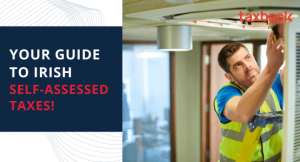Surviving a Revenue audit: You Reap what you sow
What are your chances of a Revenue audit? How you can make the best of it?
You might shudder at the thought of Revenue scrutinising every aspect of your financial affairs, but the reality is an audit can happen to anyone. Luckily, your chances of an audit have lowered significantly in the last 8 years, although when it does happen, Revenue usually has a good reason for doing so.
Unfortunately, audits will continue as long as some people avoid paying taxes, either intentionally or accidentally. Knowing how and why you might be audited is the first step to avoiding one, if it’s at all possible.
We take the hassle out of filing your Irish tax return
How does Revenue pick its targets?
Revenue picks its targets for auditing using the REAP mechanism (Risk Evaluation and Profiling) system. This programme identifies the riskiest cases using data collated from over 50 sources. Revenue uses the results to target what it sees as taxpayers they suspect of under-declaring.
Sector targeting
Two secondary mechanisms supplement REAP. Revenue periodically runs projects to investigate tax compliance in specific trades and professions. Examples of this “sector targeting” include the recent National Contractors Project, looking at personal services companies, and the Medical Consultants Programme, to address tax issues in medical consultants businesses.
Random selection:
Revenue also operates Random Audit and Re-Audit programmes to select a small number of taxpayers completely at random. However, less than 5% of audit targets are randomly generated. If you’re selected, chances are it’s because you or your sector have recently thrown up a “red flag”.
How can you avoid selection?
Red flags are patterns that don’t fit Revenue’s expectations. Naturally, there will be times when a taxpayer deviates from previous patterns for legitimate reasons.
For example, a PAYE worker may incur a high amount of medical expenses, which could prompt a PAYE compliance check. Or a sole trader may invest in new equipment, which could lower profits significantly, throwing up a red flag. So it won’t always be possible to ensure your tax return meets expectations.
All you can really do is be prepared.
Keep your records!
.jpg)
A common mistake is not maintaining proper records. Self-employed and PAYE taxpayers must keep expense receipts for at least six years. Record keeping often falls down the list of priorities as it doesn’t appear to “add value”, but you’ll thank yourself if you have these in order when the letter from Revenue finally arrives.
Don’t miss a tax return!
There’s no easier way to attract unwanted attention than by failing to make a required return. Don’t miss any filing deadlines and double-check that all your returns are complete. If you need help filing an accurate tax return, you can contact our tax professionals here.
What if you get selected?
If you get a letter from Revenue, the first thing you should do is identify which department it’s from. The address at the top right hand corner will clarify this. Is it from your local Revenue District? Or is it from the Investigations and Prosecutions division? If it’s the former, you should be able to tell if it’s a notification of a formal audit or just Revenue requesting backup documentation for a claim. If it’s the latter, you would be well advised to seek professional advice immediately.
If you’ve any doubt that your tax affairs might not be in order, take action straight away. When someone makes an “unprompted disclosure” (where no notice of audit has been received) then they can limit their penalty to 10%, whereas a “prompted disclosure” could lead to penalties at a rate of 50%.
Planning for an audit

If you’ve been contacted by Revenue and established that a formal audit has been scheduled, it’s important to start planning immediately. The scope of the audit will be outlined in the letter, which will confirm the audit period, the “tax head” under review (i.e. Income Tax, VAT, Corporate tax), and where and when the audit will take place.
Conduct a self-review: Are my records in order? Do I need more time to prepare for this? You should be able to request an extra week or two in advance of the audit. This will give you a chance to review Revenue’s Code of Practice, which outlines their procedures.
Once the scope and timeframe are established, you should decide if you need professional advice. The skills and experience a tax professional can bring may be of benefit and help lower the burden of preparation and reduce stress levels!
The average Irish tax refund is €1,880
Prevention is better than cure!
Take preventative action:
- Make sure all your returns are filed on time
- Ensure your records are up-to-date
- Become familiar with the latest regulations and guidance
Remember, accepting that audits are a normal and everyday occurrence should help reduce associated anxiety! If you need help with your tax affairs and want to ensure you tax returns are accurate, click here to contact our team of professionals.




